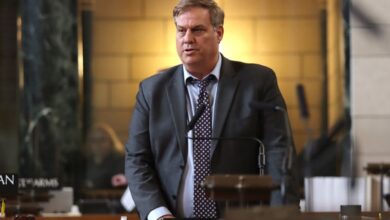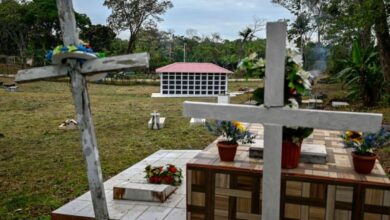Fiducia Supplicans ‘not a topic’ for Christmas season, Uruguayan cardinal says
ACI Prensa Staff, Dec 27, 2023 / 16:00 pm (CNA).
Cardinal Daniel Sturla, archbishop of Montevideo, Uruguay, said in a recent interview that the Fiducia Supplicans declaration from the Vatican’s Dicastery for the Doctrine of the Faith, which allows the blessing of homosexual couples, “was not the kind of topic to come out now at Christmas” because it’s “controversial” and the text “creates confusion.”
“I don’t think it was a topic to be brought out now at Christmas. It really caught my attention, because it’s a controversial issue and it’s creating divisions within the Church,” said the 64-year-old Salesian cardinal, who serves in the most secularized country in Latin America, where Christmas hasn’t been officially celebrated since 1919.
The declaration Fiducia Supplicans, published on Dec. 18 with the approval of Pope Francis, has drawn positive and negative reactions from bishops around the world. With the document, the Vatican allows priests to impart nonliturgical blessings to same-sex couples and heterosexual couples in an irregular relationship without this being an approval of their lifestyle.
Cardinal Víctor Manuel Fernández, prefect of the dicastery, wrote in the presentation of the document that the traditional doctrine of the Catholic Church on marriage “remains firm” and that in no way can blessings for homosexual couples or couples in an irregular situation “officially validate their status or alter in any way the perennial teaching of the Church” in this regard.
In an interview with the Uruguayan newspaper El País published on Dec. 24, Sturla noted: “It’s clear that a priest blesses all persons. I was just at a prison and I blessed everyone who was there. If people come to ask me for my blessing, I always give it. I remember when the trans law was being discussed, that we were in a procession at St. Ignatius Parish and some trans persons came to ask me for my blessing and I gave them a blessing.”
The Vatican 2021 ‘responsum’
“Another thing,” he continued, “is to bless a homosexual couple. There it is no longer the blessing of the persons, but of the couple, and the entire tradition of the Church, even a document from two years ago, says that it’s not possible to do this.”
The archbishop of Montevideo was referring to the “responsum” or official response of March 2021, of the then Congregation — now Dicastery — for the Doctrine of the Faith, headed (until July 1 of this year) by Spanish Jesuit Cardinal Luis Francisco Ladaria, which stated that the Church cannot bless homosexual couples.
To the proposed question “Does the Church have the power to impart a blessing upon unions of persons of the same sex?” the response was “negative.”
“It is not licit to impart a blessing on relationships, or partnerships, even stable, that involve sexual activity outside of marriage (i.e., outside the indissoluble union of a man and a woman open in itself to the transmission of life), as is the case of the unions between persons of the same sex. The presence in such relationships of positive elements, which are in themselves to be valued and appreciated, cannot justify these relationships and render them legitimate objects of an ecclesial blessing, since the positive elements exist within the context of a union not ordered to the Creator’s plan,” the document explained.
Fiducia Supplicans ‘creates confusion’
In the interview with El País, Sturla pointed out that the Fiducia Supplicans declaration “creates confusion, because it says that you can bless, but not by means of a rite. In short, what I believe is that persons can be blessed but such couples as couples cannot.”
“It’s a no but yes, and a yes but no. The same document says that it doesn’t change the doctrine of the Church. Given the lack of clarity of the document, in my reading of it, I understand that the practice that the Church has had until now must be continued, which is to bless all persons who ask for a blessing but not to bless couples of the same sex.”
“If what you want is to get closer to people and make homosexuals feel part of the Church, that’s fine with me. Because the Church is for everyone. But there are certain rules. You also don’t bless an unmarried couple. Unions that the Church herself says are not in accordance with God’s plan cannot be blessed,” the cardinal continued.
In Africa they have said ‘not in their countries’
The archbishop also said that Fiducia Supplicans says “there can’t be a rite, which cannot be done publicly either… It creates a confusing situation. When you bless persons, you don’t ask what their situation is. And it’s always done and to whomever. We will continue with the same practice until it gets clarified. The document has caused division. In the Churches of Africa they have said that in their countries, no.”
On Dec. 19, the bishops of Malawi published a document in which they specified that blessings of homosexual couples “are not permitted.” Two days later, on Dec. 21, Cardinal Fridolin Ambongo, archbishop of Kinshasa and president of the Synod of Bishops’ Conferences of Africa and Madagascar (SECAM), addressed his brother bishops to get their opinions on Fiducia Supplicans, with the aim of providing “unequivocal clarity” to the people of God in the second-largest and second most populated continent in the world.
Not a pronouncement ‘on the level of dogma’
Sturla also explained that “in the Church there is a hierarchy of documents. This is not a pronouncement by the pope that is on the level of dogma. In addition, two years ago a document from the Holy See said just the opposite. “We have to wait a little and for the waters to take the proper course.”
The Uruguayan cardinal stressed that with blessings for homosexual couples, “as it is something that remains in the area of privacy, each priest must understand and decide what to do.”
“I have heard from priests who are disconcerted by this. And what I tell them is that persons can be blessed,” he concluded.
This story was first publishedby ACI Prensa, CNA’s Spanish-language news partner. It has been translated and adapted by CNA.






